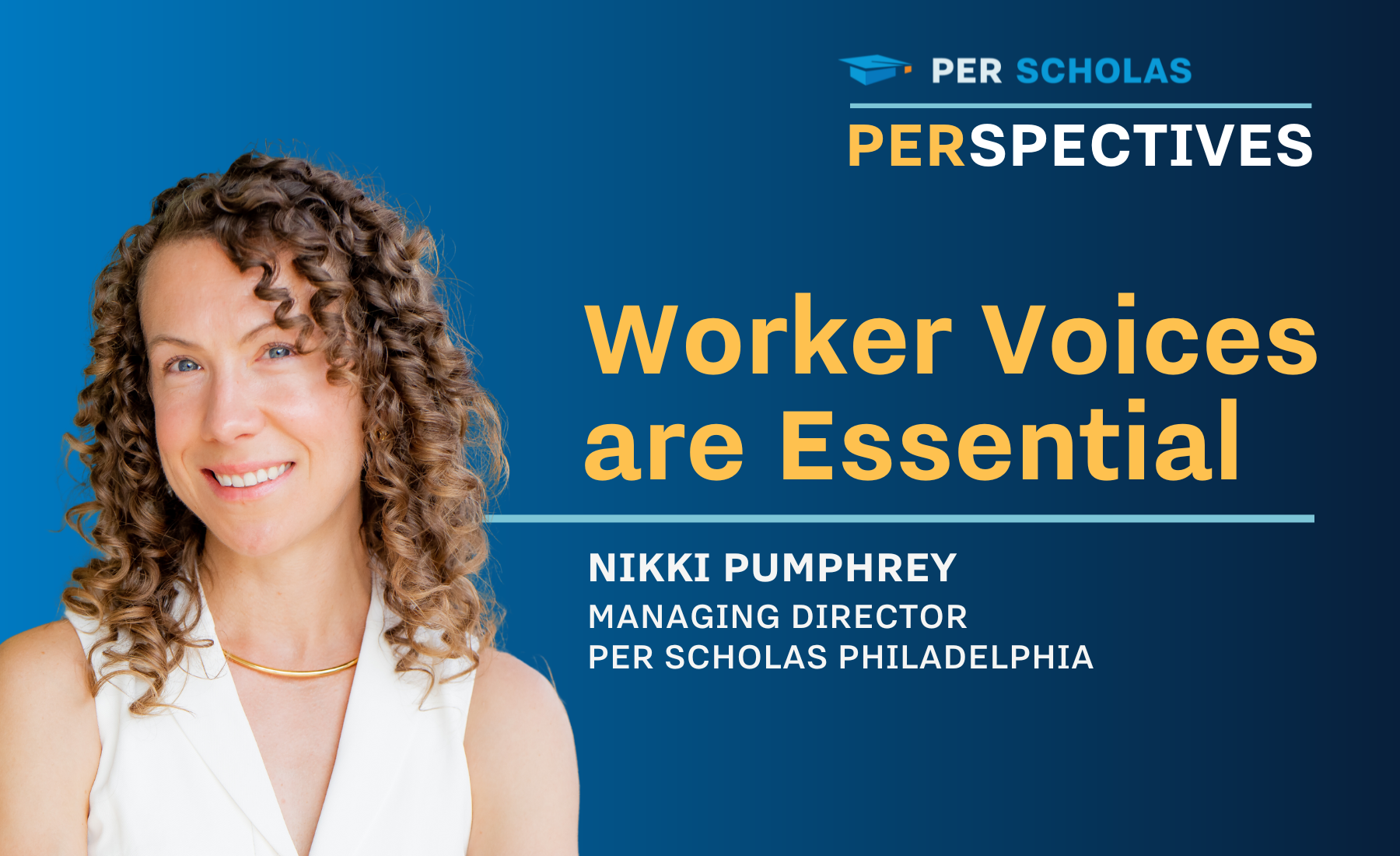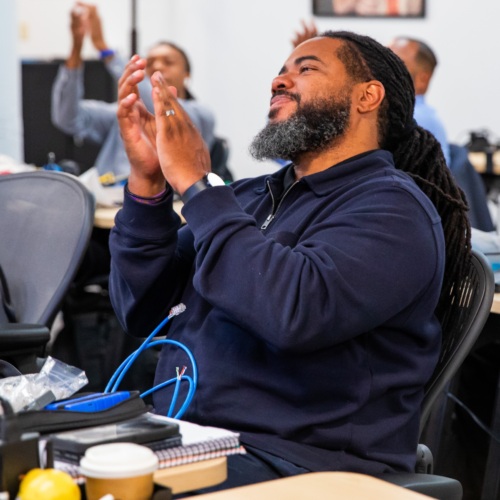
Worker Voices are Essential

“It feels surreal to be here. I can’t wait to tell my story.” Those are the words David Byard said to me last month as we prepared for the Connecting Communities webinar to start. David’s path from Per Scholas learner to Teaching Fellow began at the height of the pandemic in 2020. However, his journey to this stage was 13 years in the making.
Unequal Access to Agency
Like most major cities, Philadelphia felt the sharp effects of a slowed economy at the beginning of the COVID-19 pandemic. Closures and layoffs mostly affected those in low-wage jobs, without a college degree, and in service sector occupations. For Philadelphia, this meant that black and female workers were disproportionately displaced from the labor market. Even as our region mounted a recovery through 2021, the number of jobs in Philadelphia was 7.6% lower than it had been in 2019 (1).
Despite a slow recovery, by 2022 most sectors were where they had been three years earlier and labor market data indicated overall unemployment approaching historic lows. Why were employers still struggling to find skilled workers, especially in low-wage occupations? What was driving this disconnect?
A tight labor market on its surface implies agency: workers able to make active choices and ease of movement between opportunities. This data is incomplete and does little to capture the nuanced personal and financial decisions many workers had to face, especially about returning to low-wage, low-quality working conditions. How do we capture the lived experience of workers to better inform equitable recovery efforts?
Finding Worker Voices
In May 2022, the Federal Reserve System launched The Worker Voices Project to answer such questions and better understand how workers were navigating employment and what experiences were motivating their decisions. The results of this qualitative study were published in August in a report titled “Worker Voices: Shifting Perspectives and Expectations on Employment”. (2) On August 10th, the Federal Reserve Banks of Philadelphia, Atlanta, and St. Louis co-hosted a webinar to launch the report, and featured amongst its keynote speakers was Per Scholas’ own, David Byard.
An accomplished musician and producer, David Byard always aspired for a career in technology. The pandemic created a perfect storm: after a decade as a security guard, David was laid off from his job and found himself searching for a more stable profession outside of the service sector. In 2020, David enrolled at Per Scholas and completed his IT Support training and earned both his CompTIA A+ certification and Google IT Support Certificate and, through foundational employer partner TEKsystems, landed his first tech support contract. He went on to work as a successful contractor on projects for companies including Comcast, Jefferson Health, and Five Below.
Quality Jobs and Self-Investment
The Worker Voices project codified through 19 focus groups and feedback from 167 participants what many community-based workforce development partners and employers knew anecdotally: workers were forced to make complex decisions based on health and family needs and that a tight labor market was not equally beneficial. Furthermore, workers expressed a renewed expectation of job quality, beyond just compensation, and a willingness to seek out employers adhering to those standards.
When the Biden Administration launched its Good Jobs Principles in the summer of 2022, it was a response to the need for both worker stability as well as defining principles for long-term employer economic competitiveness. At Per Scholas, we have seen the benefits of this work through our Per Scholas Diverse by Design efforts, as employers sign on to our shared value platform. Since its founding in 2016, we’ve been helping organizations center diversity as part of their practices to attract, retain, and develop skilled diverse tech professionals.
Worker voices were essential to inform these policies and help organizations like Per Scholas support transformative change.
The Worker Voices Project study also uplifted the opportunity that many workers saw to invest in themselves, often re-skilling for more resilient occupations. Information Technology – and the many trainings offered through Per Scholas – was not only one of the most sought-after industries but also remains accessible for career changers seeking future financial stability. This stability and security was what motivated David Byard in 2020 to begin a new career in IT through Per Scholas.
Future Resilience: Investing in Upskilling
During the pandemic, and perhaps even more so recently, we have seen a greater adoption of skills-based hiring. The World Economic Forum predicted that 45% of companies had focused efforts on hiring based on competencies by 2022. This trend is likely to continue as new labor market dynamics emerge and talent shortages continue. Employers are not only making more informed choices about how they attract talent but also about how to develop effective skill-building strategies for incumbent workers. A well-executed upskilling training plan may become the next competitive advantage for those already focused on quality jobs. Organizations including Per Scholas are not only helping employer partners connect to skilled talent, but also helping them craft upskilling strategies.
Workers signaled a need for change through their actions during the pandemic. An economy that works for everyone – especially those most at risk during an economic crisis – must incorporate, include, and adjust to change.
David came back to Per Scholas in 2022, where he launched the next phase of his career as an educator. Most days he is a Teaching Fellow for IT Support in Philadelphia – but on special days – he serves as a vocal advocate for IT professionals, career changers, and Per Scholas learners on stages like a national webinar hosted by The Federal Reserve Banks.
Watch the full Shifting Perspectives and Expectations on Employment webinar here!
Sign up for our Monthly Impact Report
More News

Donate Now
Your support makes a powerful difference in our ability to build a technology talent training solution that creates greater access and equity.

